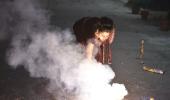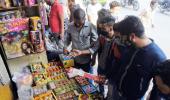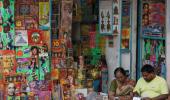According to the Indian Fireworks’ Manufacturers’ Association, the ban would wipe out sales of around Rs 600 crore during the upcoming Deepavali season.

Tamil Nadu Chief Minister M K Stalin has urged his counterparts in Delhi, Odisha, Rajasthan and Haryana to lift the blanket ban on the sale of firecrackers, amplifying the voice of an industry reeling from a severe financial stress owing to Covid-19 and environmental norms.
Sivakasi in Virudhunagar district of Tamil Nadu is the firecracker hub of the nation. According to the Indian Fireworks’ Manufacturers’ Association, the ban would wipe out sales of around Rs 600 crore during the upcoming Deepavali season.
In a letter to the four CMs, Stalin said, “It has been brought to my notice that your government has imposed a ban on the sale of firecrackers during this festival season (Diwali 2021). I wish to draw your attention to the fact that the Supreme Court has already banned certain categories of polluting firecrackers and now, green crackers with significantly less emissions are being manufactured. Therefore, a blanket ban on firecrackers is not reasonable.”
Sivakasi contributes to almost 90 per cent of the fireworks made in the country, providing jobs to around 300,000 people directly and another 500,000 indirectly. The industry’s size has halved to Rs 1,500 crore compared to Rs 3,000 crore before the pandemic.
“Such a ban is not prevalent in other countries. Moreover, such a ban, if imposed by other states also, would lead to the closure of the entire industry, jeopardizing the livelihood of around 800,000 persons. You would also appreciate that bursting of firecrackers is an integral part of Indian festivals, especially Diwali. A balanced approach that gives due regard to environment, livelihood and public health is possible and necessary,” Stalin added.
The rise in the prices of raw material -- like aluminium by 30 per cent, sulphur by 100 per cent and paper and paper products by 40-60 per cent -- has also affected the operating cost of Sivakasi businesses.
According to industry bodies, over 200 fireworks manufacturing units were shut down in the region in the last one year.
“There is no logical reason behind such a ban. These four states contribute to around Rs 600 crore of our business. Moreover, the governments should understand that Diwali is part of our culture and a ban on crackers will affect that tradition,” said T Kannan, general secretary of TIFMA.
In December 2020, the National Green Tribunal had banned the sale and use of all firecrackers in around 122 cities across the country based on the air-quality index in that region. In July this year, the Supreme Court had dismissed a challenge by the industry against this order.
Kannan pointed out that it would be wrong to say that crackers are the reason for the air pollution in cities like Delhi, citing a study by the Indian Institute of Technology in Kanpur.
According to the report, road dust, industrial stack, vehicles, concrete batching, domestic fuel burning, hotels, construction and municipal solid waste burning are the major reasons for pollution in the city.












 © 2025
© 2025